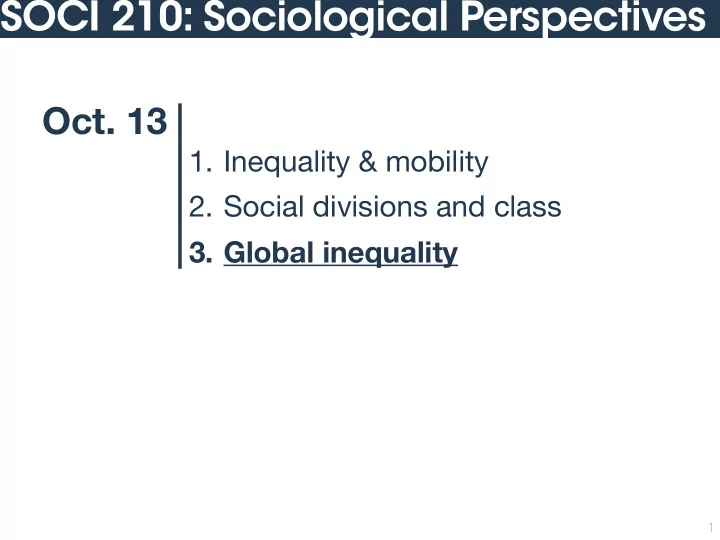

SOCI 210: Sociological Perspectives Oct. 13 1. Inequality & mobility 2. Social divisions and class 3. Global inequality 1
Inequality on a Global Scale 2
Global inequality Sociology of inequality often takes the nation-state as its unit • Stratification within a particular country or province • E ff ects of state-level policy on rates of poverty and inequality • Comparison across countries Global inequality? • What does inequality look like at a global scale? 3
Global inequality Gini index (wealth) Gini index Ukraine Kazakhstan Egypt 90 Russia India United States 80 Indonesia Brazil Canada 70 China Pakistan Japan 60 Myanmar Timor-Leste 50 Slovakia 100 thousand 1 million 10 million 100 million 1 billion Adult population Source: Credit Suisse Global Wealth Databook 2018 4
Global inequality Gini index (wealth) Gini index Ukraine Kazakhstan World Egypt 90 Russia India United States 80 Indonesia Brazil Canada 70 China Pakistan Japan 60 Myanmar Timor-Leste 50 Slovakia 100 thousand 1 million 10 million 100 million 1 billion Adult population Source: Credit Suisse Global Wealth Databook 2018 5
Global inequality First takeaway ⦙ Global inequality is severe and getting worse ⦙ The wealthy are getting (much) wealthier ⦙ The poor are getting (much) poorer ⦙ Poorest half of planet has ~35% less wealth now than in 2010 Oxfam press release, 18th Jan 2016 Second takeaway ⦙ The di ff erence between the national frame and the global frame is not just one of scale ⦙ Inequality has a distinct character in a global context 6
Globalization 7
Globalization Globalization: the process of national boundaries becoming less relevant as they become more “porous” Money and goods Information ⦙ “Globalization” often refers just to the ⦙ Global communication (especially the globalization of trade Internet) has made it easier to interact across national boundaries ⦙ Trend since industrial revolution toward cross-national trade ⦙ Harder for government to prevent independent of state influence international communication ⦙ Explosive growth in second half of People 20 th century ⦙ Globalization traditionally meant fewer Formal international agreements (NAFTA, EU, …). barriers for migration from country to Rise of multinational and transnational country corporations. ⦙ In recent years, there has been a strong ⦙ Corporations become “location-less” backlash and restrictions on many borders Environment ⦙ Scale of global economy a ff ects shared environment in meaningful, lasting ways ⦙ “Externalities” ignore national boundaries 8
Globalization Globalization and inequality • Globalization is not neutral toward inequality • Trade � The history of colonialism is one of globalized trade reinforcing wealth disparity • Information � Those with the means to exploit globalized media have greater influence (marketing campaigns, political influence, etc.) • People � Migration is highly imbalanced, and state policies are designed to maintain power differences • Environment � The immediate and long-term negative effects of environmental transformation hit the poor hardest 9
Theories of Global Inequality 10
Theories of global inequality Modernization theory • Nation-states are all on a path toward full modernization/industrialization • Inequality exists because some countries are “ahead” of others • Over time, the world will equalize as contrasts diminish • Ignores inter-dependence of nations Wealth ➔ Time ➔ 11
Theories of global inequality Dependency theory • Wealthy nations keep poor nations dependent Manufacturing: raw materials extracted, finished goods sold Finance: World Bank and IMF use debt to maintain relationship • Relationship between wealthy and poor nations maintains inequality by design • Built on global colonial history 12
Recommend
More recommend